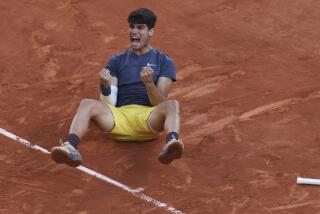Fistful of Chang : 17-Year-Old Stops Edberg in 5 Sets for French Men’s Title
- Share via
PARIS — For the first time seemingly since Mona Lisa was a baby, an American has won the French Open.
Frame this one and hang it in the Louvre.
It took 3 hours 41 minutes for a 17-year-old kid from Southern California to end a 34-year-old winless streak at Roland Garros, where the hopes of every U.S. male player since 1955 lay buried beneath its red clay.
On a sunny Sunday afternoon, Michael Chang became the youngest to win a Grand Slam men’s singles title when he captured the French Open championship with a 6-1, 3-6, 4-6, 6-4, 6-2 decision over Stefan Edberg of Sweden.
Chang, from Placentia, weathered a blizzard of break points in the fourth set when Edberg, the latest in a long line of Swedes in the final here, seemed only a volley away from victory.
But Edberg found himself playing an iceberg.
And it started to wear on him in the fourth set, beginning in third game.
From then on, 10 times Edberg was a point away from breaking Chang’s serve and 10 times Chang turned him away when even he felt he couldn’t.
“I really thought that the match was gone,” Chang said. “But a chance went through my head. I thought, ‘Hey, maybe I can do this.’ ”
For Edberg, it was a demoralizing defeat. Ahead a set and a break, he was cruising along like one of those party barges on the Seine. The break points piled up, but one by one they disappeared.
Edberg had four break points that would have put him up 2-1. He had five more that would have made it 4-3 and another for 5-4. However, Chang saved them all, snatching the last one away from Edberg in what became typical fashion.
Chang sent a backhand pass at Edberg like a heat-seeking missile and the Swede volleyed the ball into the net.
So it was Edberg, not Chang, who was serving to stay in the set at 4-5 in the fourth.
Fatigued from trying to punch a volley past someone who patrolled the baseline as if he were on roller skates, Edberg double-faulted twice and put two volleys in the net to give the fourth set to Chang, 6-4.
Edberg was the 11th Swede in the past 12 years to play in the final here, but at this point he began to wonder why he ever crossed rackets with Chang.
“He played a lot of tough matches the whole tournament and he kept coming back all the time,” Edberg said. “You have to admire him for that.”
Maybe someone older wouldn’t have, Edberg said.
“But he’s young and he doesn’t think that much.”
Edberg, a two-time winner of the Australian Open and the reigning Wimbledon champion, had the look of a champion again. He began the fifth set by breaking Chang’s serve.
But at 15-40, Chang broke back. On the first break point, he produced a Grand Slam quality drop shot, which he feathered over the net by just slightly touching the ball with his racket.
The beginning of the end for Edberg and the beginning for Chang arrived in the next game.
Quickly, Edberg fell behind 0-40. He saved two break points, but then Chang came up with a Grand Slam quality lob to get the break he needed.
Edberg forced Chang to retreat to the baseline with a powerful approach shot, but Chang put up a artful lob that flew over Edberg’s head, bounced once and skipped away as if it were being pulled by a string.
The next game was longer than the French Revolution, but when it was over, Chang put the match in his bag.
Once again, he did it the hard way. Down two break points, Chang saw Edberg force the game to deuce four times, but pulled it out after the final one when two consecutive Edberg backhands sailed wide.
Chang won his service game at 15 to lead, 5-2. Edberg covered his head with a towel at the changeover. It was the last one.
Another lob winner by Chang and Edberg could only wave at it with his racket. At 15-30, Edberg sent a forehand into the net.
A crowd of 16,500 filled the stadium court from the bottom row to the top and cheered in anticipation of what was soon to come. On match point, Edberg put one last forehand into the net and put Chang in the record books.
Chang, however, has to be content with being the youngest known male winner. In 1905, 17-year-old Rodney Heath of Australia won the first Australian championship, but his exact birth date is unknown.
Chang, who is 17 years 3 1/2 months old, struggled with his new found place in tennis history, although he definitely seemed to like it.
“It’s hard to really think about it,” he said. “It just doesn’t click in my head. It’s definitely a great honor. It’s definitely an achievement that will be with me no matter how I do the rest of my career.
“It’s definitely probably the highest achievement that I could ever have.”
But not definitely.
“I hope maybe one day I’ll be able to achieve something greater than this.”
His work began with unexpected ease. Chang closed out the first set in just 32 minutes with a forehand volley winner.
“He started playing unbelievable,” Edberg said. “I don’t think he made many mistakes the first hour.”
Throughout the tournament, Edberg stuck to his serve-and-volley style, which although it presented a target for Chang’s passing shots, often worked for him, just as it did when Yannick Noah won the 1983 final.
Chang had a tactic of his own. Edberg’s serve is particularly devastating on clay because it bounces so high that returns are difficult. But Chang moved inside the baseline to take the ball quickly.
It worked. Edberg’s serve, which had dismantled Alberto Mancini and Boris Becker, did not blow over Chang, who also made another change in his tactics by attacking Edberg’s ground strokes.
Edberg’s frustration grew.
On Chang’s speed: “He’s so quick, he gets a lot of time to hit the ball.”
On Chang’s accuracy: “He very seldom misses a passing shot.”
But as well as Chang began, the middle of the match belonged to Edberg. Chang lost seven consecutive games at the end of the second set and the start of the third.
He was reeling. Then came the third set. He thought it was over.
Why wasn’t it?
“I really don’t know,” Chang said. “The fourth set was just a couple of points here and there. Stefan gave me an opening, I guess, but I finally believed there was a chance I could come back.”
The winner’s share of the French Open is $291,752, which not only more than doubles his career earnings, but also goes along nicely with the distinction of winning one of his sport’s biggest honors.
In the last week, Chang beat the No. 1 player in the world, Ivan Lendl, and the No. 3, Edberg. His No. 19 ranking is expected to improve to the top 10 when the new rankings come out today.
He becomes the sixth U.S. player to win the French Open, joining such players as Don Budge (1938), Don McNeill (1939), Frank Parker (1948-49), Budge Patty (1950) and Trabert (1954-55).
Chang’s title is also the first Grand Slam singles title for a U.S. man since John McEnroe won the U.S. Open in 1984. The other Grand Slam events are Wimbledon and the Australian Open.
Now that he has one, Chang said there could be more.
“I don’t want to limit myself,” he said. “I don’t want to say, ‘OK, Michael, you’ve won Roland Garros and that’s it.’ I want to keep on going and do better.”
Tennis Notes
What is the secret of Michael Chang? “Head, mind, strategy,” said Joe Chang, Michael’s father. “He’s the kind of guy that when you look at him one game, one match, you can’t be impressed. But you watch him from match to match and he looks better and better.
Chang Gang: All of Chang’s family watched him win from the stands of Roland Garros: Joe and Betty Chang cheered their youngest son while older brother Carl sat on the front row. Joe Chang had to return because he left before Michael’s match with Ivan Lendl. “In my head, I didn’t think he could beat Lendl. Not on clay, in three of five sets. It’s almost impossible.” The elder Chang said Michael’s victory in the finals over Stefan Edberg was hard to believe. “That’s not real. I think it is just a dream.” Joe Chang said he watched videotapes of Edberg’s matches and gave Michael a scouting report. His plan was to play a hardcourt strategy on clay. “We noticed when (Alberto) Mancini was playing Stefan, he was not able to return serve. So we had Michael attack the ball on the service return and play more aggressively.”
To get ready for Wimbledon, Chang will play in an eight-man grass-court exhibition in Amsterdam this week and another exhibition the week before Wimbledon in London. Also playing in the London exhibition? Edberg. . . . Chang is scheduled to play in the Volvo tournament at the Los Angeles Tennis Center, beginning Sept. 18 at UCLA.
SEVEN IS HIS LUCKY NUMBER
Michael Chang’s French Open final victory over Stefan Edberg was his seventh in the tournament. Chang spent a total of 20 hours and 38 minutes on the court and played 28 sets. Here is the path Chang followed to win his first Grand Slam tournament:
Opponent, Score Time First round defeated Eduardo Masso, Argentina, 3 2:36 6-7, 6-3, 6-0, 6- Second round defeated Pete Sampras, United States, 1 1:41 6-1, 6-1, 6- Third round defeated Francisco Roig, Spain, 3 1:46 6-0, 7-5, 6- Fourth round defeated Ivan Lendl, Czechoslovakia, 3 4:37 4-6, 4-6, 6-3, 6-3, 6- Quarterfinal defeated Ronald Agenor, Haiti, 6 3:12 6-4, 2-6, 6-4, 7- Semifinal defeated Andrei Chesnokov, Soviet Union, 5 4:05 6-1, 5-7, 7-6, 7- Final defeated Stefan Edberg, Sweden, 2 3:41 6-1, 3-6, 4-6, 6-4, 6-
More to Read
Go beyond the scoreboard
Get the latest on L.A.'s teams in the daily Sports Report newsletter.
You may occasionally receive promotional content from the Los Angeles Times.










